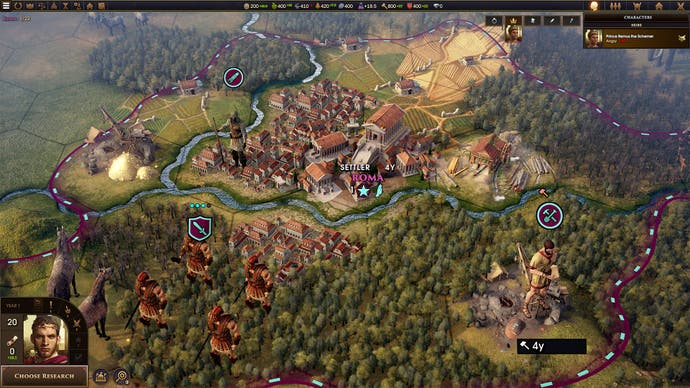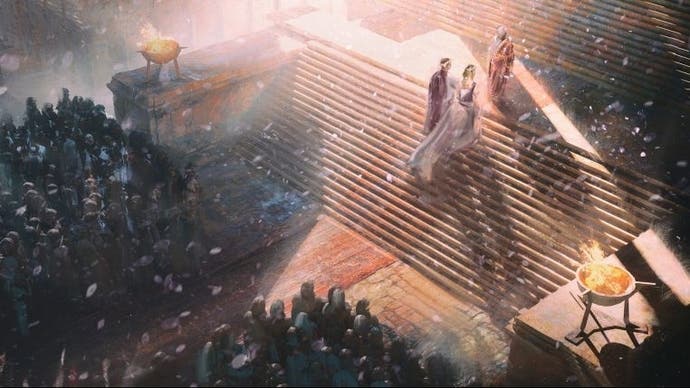Opening up strategy design - Old World meets early access
"Why didn't I think of that?"
One of the most exciting things I've seen in strategy and simulation games for an age is a screen that loads in when you boot up Industries of Titan. Industries of Titan is a game about making a foothold on the toxic and generally hideous surface of Saturn's moon. This screen shows that the developers of Industries of Titan are busy making a foothold on the surface of the Epic Games Store, toxicity and hideousness unknown but I certainly like the font they use. Anyway, Industries of Titan is in early access, and this is the roadmap. When I first looked at it I wasn't just excited by the thought of all these features that will be coming to the game. I was emboldened in a strange, cowardly way, if cowards can even be emboldened: here was a game that was by necessity stripped back. If there was a moment for someone like me, someone hesitant and a bit stupid, to make a success of Titan, this was surely it.
And it made me thing about strategy games and early access. The potential of this combination - a game made of hundreds of interlocking pieces, and a release schedule that allows for the game to build itself up in stages, like a model taking shape in a 3D printer. Anyway, I was thinking about all of this when I came across Old World, the new strategy game from Mohawk Games, also on the Epic Store. This is a team with experience in games like Offworld Trading Company, in which you can kill people with the futures market, if I remember correctly, and Civilization 3 and 4. And it's in early access too!
Even if you take early access out of it, Old World is pretty exciting stuff. On the surface it's a traditional 4X strategy game - here's the ancient world, pick a civ and go at it. There are differences everywhere you look - some of them, like the way units can move, with orders being a resource, are pretty fundamental to the game - but it's still very comforting in that way Civ games can be. Not comforting because of what you're doing, which is often horrific, but because of the ruminative flow these games settle into.
(The big difference here comes down to the civ you choose, incidentally. Let's say you're playing Civ 5 and you choose Brazil. Good choice! The best choice. Your leader's Pedro II, and he's going to be your leader for the whole game. Pedro II must have been drinking a lot of those pomegranate drinks you get in Waitrose, because he's going to be alive for thousands of years. In Old World, that's not the case. You choose a civ, you meet the ruler. They age as your turns pile up. They die. They are replaced. Your new ruler ages and dies. Onwards.)
Old World's approach to early access is entirely different to Industries of Titan, because 4X games are entirely different to simulation games. It's less easy to add the pieces as you go along with a 4X. As a result, Old World didn't go into early access until all its systems were implemented. When I catch up with Leyla Johnson, the president of Mohawk Games, shortly after the game's release, she seems pretty happy with how things are going - exhausted but happy. The team has been working constantly, but people have been streaming the game and seem to be enjoying it. On top of that, "the good stuff started incoming, bugs, crashes, questions, and feedback of all sorts," Johnson explains.
Early access works for games like Old World because they're replayable, Johnson tells me. The team quickly gets an idea as to which parts of the game are enjoyable and which need work.
In other words, you have to be prepared for early access to affect design considerably. "Especially if the dev team starts watching people stream the game with multiple people watching and suggesting alternative design and gameplay," Johnson says. "The "oh, yeah, why didn't I think of that?" or when you hear a good idea and go "I wonder if I can find a way to implement this, this is a really good idea" - trusting people who know better how to enjoy themselves playing your games is a huge advantage with early access.

"Ultimately, every design has problems, and as far as we know early access is the best way to find out about these problems, while still being able to do something about them."
This is why early access is such an obvious choice - especially for a team of eleven developers. "We are making a game for a huge audience," Johnson explains. "And the best way to know whether or not we are on the right track, is to unleash it to the masses that we have. Largely when we are a small team, the benefits outweigh any other option. We think we know what our players like, and what would be entertaining and valuable, and we throw it out there for the test. Fans can have an incredible amount of energy and passion for games, and you can harness that energy very effectively during that phase. When you discuss these issues with them, you are not just humoring them, you can make a change and have it work differently the next week."
Alongside monitoring bugs and other feedback, Old World has gone into early access with some interesting ideas that the team is keeping a close eye on. "Our goals are to validate out theories about the design," says Johnson. "For example we do not have a negotiating table for Diplomacy, which has been the standard since Civ 3. Instead we are using the event system for Diplomacy, as we feel that will make diplomacy more life-like than the much more transactional bargaining table. However, we won't know if we are right unless we have thousands of players trying it."
The most striking thing Johnson tells me gets to the heart of what an opportunity early access can be. It's not just about getting the money to finish the project. "For us, the game was ready last year, many said," she tells me. "But we were not. We wanted to make the game we wanted to make first, and then open it up."


